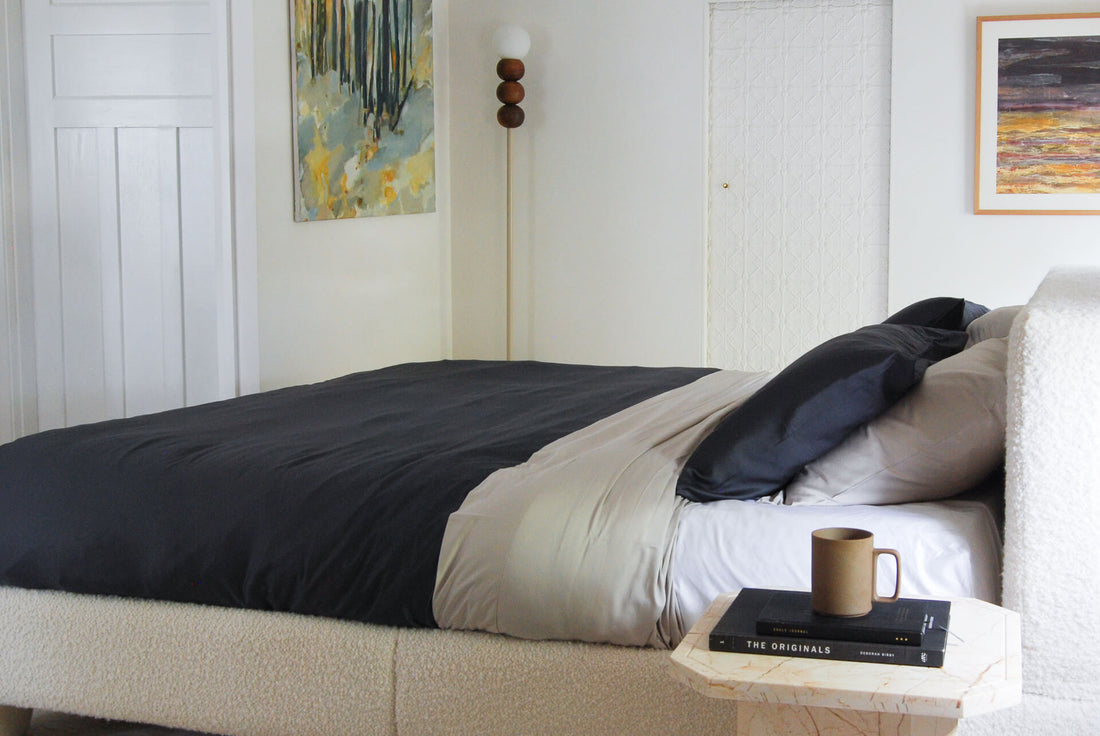Getting a good night’s rest is important to stay healthy. However, it can be difficult to sleep through the night if you have family members around, live in an area with noisy surroundings, or are a light sleeper.
White noise is one of the most popular ways to help people fall asleep. You've probably heard of it, but what is it? Do you really need white noise or can you just use your fan? And if you do need white noise, what kind of white noise should you use?
Let's take a look at how white noise works and how it might help improve your sleep quality.
What is white noise?
White noise is a sound that contains an even distribution of frequencies across the spectrum. It is more like a collection of sounds rather than any one particular sound, and there are two ways to generate it: electronically or naturally.
Electronic white noise generators can be purchased as standalone devices, or built into items such as fans or humidifiers. These types are great for masking unwanted noises in the environment like loud traffic outside your window, but they can also be used to help you fall asleep at night by drowning out other sounds in the room when you lie down for bed.
Natural sources include rushing waterfalls, the wind blowing through trees and leaves rustling against each other—any time something vibrates at multiple frequencies simultaneously (as opposed to just one frequency). This means you can use natural white noise generators whenever available; for example, if you're camping at night and want some background noise while sleeping under canvas on the ground next door. The best part about this kind of generator is that it won't dry out your sinuses because its source isn't heated up by friction like mechanical machines often are.
How does white noise work?
When you're trying to sleep, you want your bedroom to be as quiet and peaceful as possible. But if your family members are snoring or talking in bed next to you, or if there's construction going on nearby, it might be hard to get some shut-eye. White noise can help drown out these noises and help create an environment that makes it easier for you to relax and fall asleep.
White noise is a random sound that masks other noises so they don't bother us as much. Unlike white light (which contains all visible colors), white noise contains sounds of all frequencies combined together at equal intensity. The human ear isn't able to hear any particular frequency in white noise; therefore, our brains interpret the combination of frequencies as one continuous sound—and therefore not distracting.
It also helps mask specific sounds like a dog barking or traffic outside so we're less aware of them interfering with our sleep quality.
Why do people use white noise to fall asleep?
The benefits of white noise are wide-ranging. For one thing, it can help mask external noises that might otherwise disturb your sleep.
It works well as a snoring remedy: if one person in a couple is snoring loudly while they sleep, then their partner may be kept awake by the sound—but with white noise playing over speakers or headphones nearby, this problem is effectively solved.
White noise can also be beneficial during the day. Many people find that they enjoy having some kind of low-level ambient sound around them while they go about their days—it helps drown out distractions in the office or at home and provides just enough stimulation without being too audible.
This makes sense because our brains are always trying to interpret what we hear around us; when we don't have enough input from our ears (or from other senses) it becomes harder for us to focus on anything else, like taking care of household chores.
Can white noise improve sleep quality?
Sleep quality is a big deal. If you're having trouble sleeping, you may be tempted to try anything that might help. White noise can be one such thing. It has been shown to reduce sleep disturbances, which can improve sleep quality in some people.
The good news is that white noise can have positive effects on some people's sleep quality even if it doesn't help them fall asleep quicker or stay asleep longer.
How can I get the best night's sleep with white noise?
- Choose a white noise machine that suits your needs.
White noise machines are a great tool for helping you sleep, but only if you use them correctly. If you’re struggling with insomnia and want to give this method a try, get yourself the right type of white noise machine then make sure your machine is set up properly and ready to go.
- Find the right volume for you and use it consistently.
The most important thing to consider when buying a white noise machine is the volume. If you are looking for something that will drown out distractions or help you fall asleep, look for one with options ranging from low to high volume settings. You should also consider how often you will be using your device and whether you need a battery-powered option or want something that plugs into an outlet.
Does white noise have any drawbacks?
The biggest drawback of white noise is that it can be distracting for some people. The sound is often described as "hissing," which makes it difficult to sleep if you are sensitive to sound. If you live with a snoring partner, this may not be an issue for you; however, if you're alone in your apartment and trying to catch up on some shut-eye after a hard day at work and there's no one around to help drown out the noise of the city outside, then this effect becomes more pronounced.
Another potential downside is that white noise may become annoying over time. After all, who wants their ears filled with static? While some people find it soothing (maybe even hypnotic), others find that they get used to it after just a few nights' use—and then they're stuck listening to an irritating drone instead of being able to hear themselves think or fall asleep easily.
Finally, finding the right type of sound file can be difficult: some people prefer natural sounds like ocean waves crashing against rocks while others want something more synthetic like rainfall mixed with crickets chirping during summertime. Overall, it’s important to test out white noise through the use of online platforms like Spotify or Youtube, before committing to buying an expensive white noise machine.
White noise could help you sleep, but it might not work for everyone.
White noise is not a cure-all for sleep problems, but it may help you fall asleep faster, stay asleep longer and sleep more deeply. If you're having trouble sleeping or would like to sleep better, white noise can be an effective tool to add to the arsenal of your nighttime routine.
That said, not everyone is going to reap the same benefits from listening to white noise at night. For example, some people prefer silence when they go to bed (or even during the day), while others find it too distracting. In these cases white noise can be counterproductive—not only does it fail as a relaxation tool but also because it disrupts your ability to get quality shut-eye when all you want is silence.



